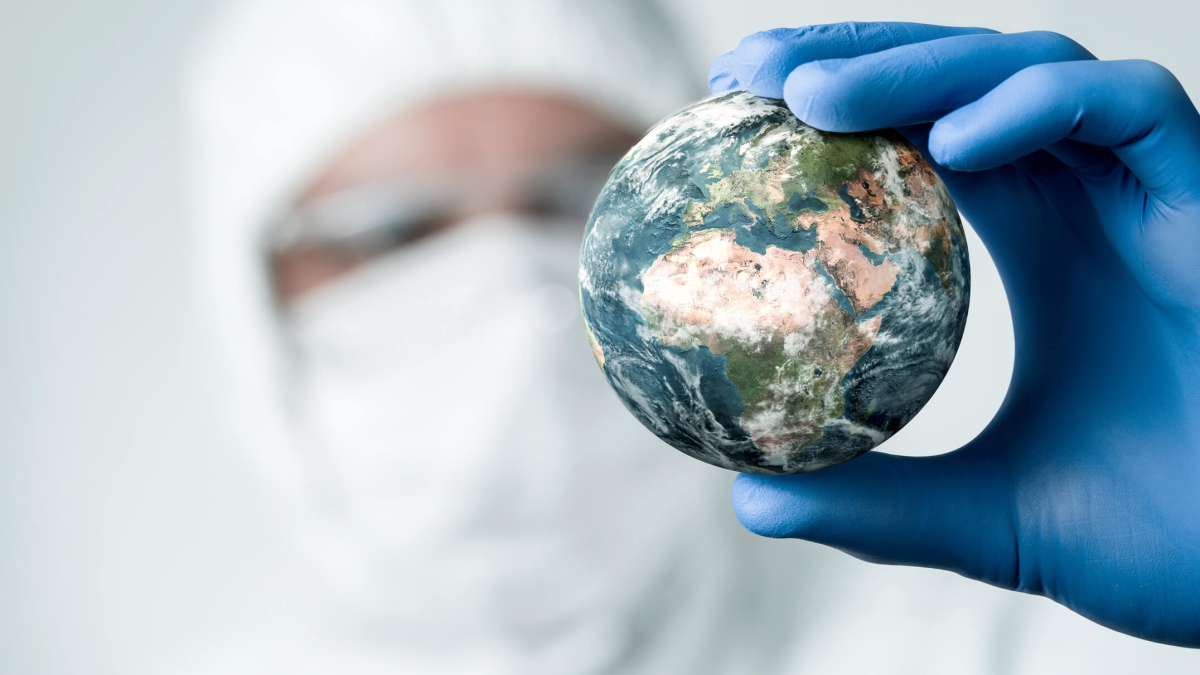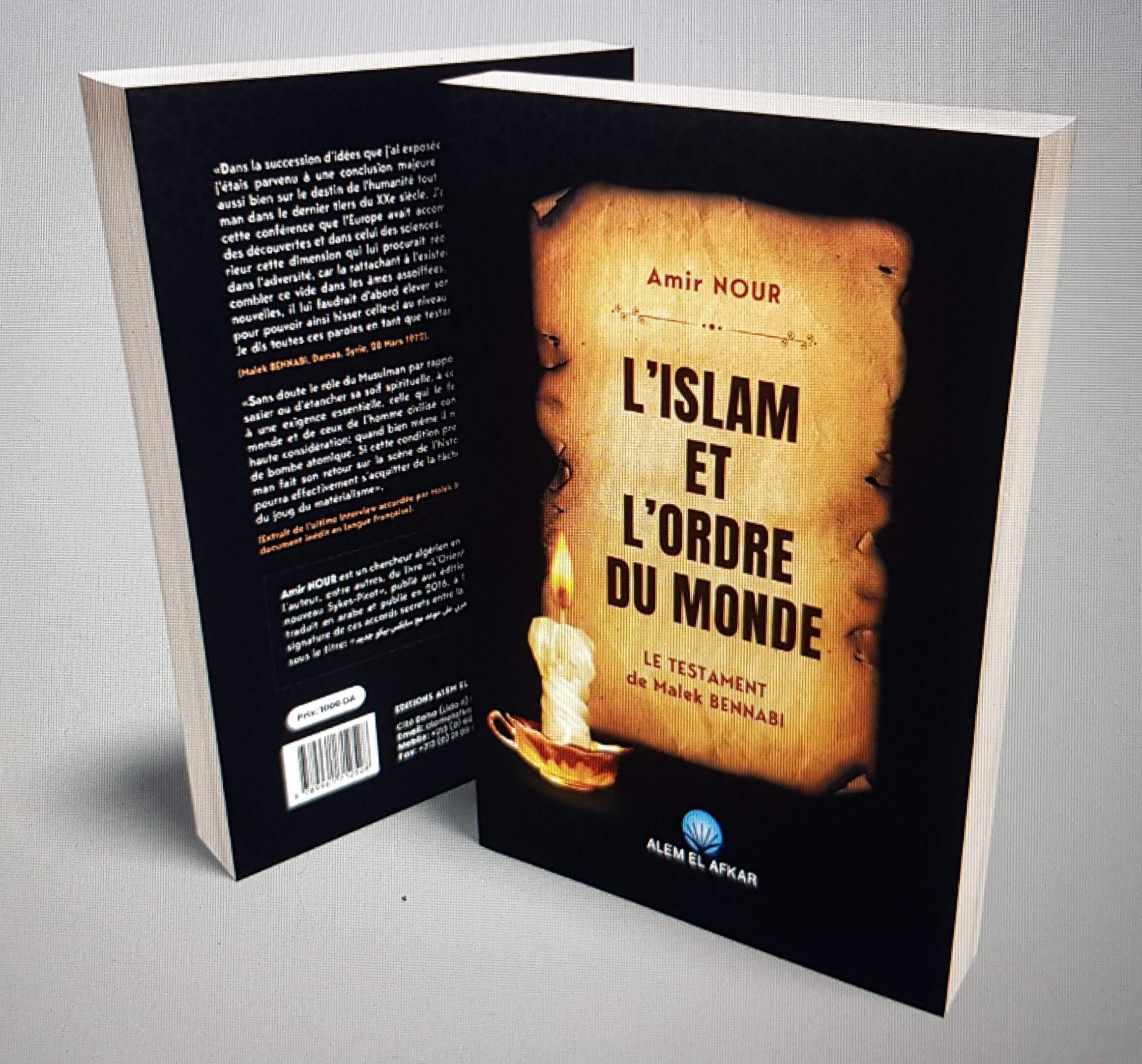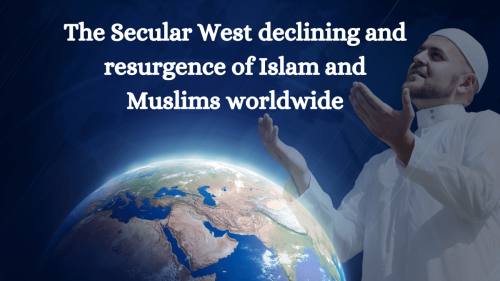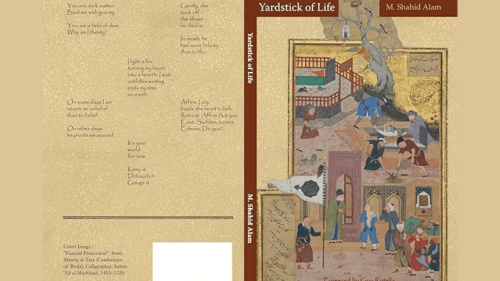Islam Constitutes Safest Sanctuary for Humanity

Letter From Beyond The Grave: Malek Bennabi, Modern Man and Covid-19
“What surprises me most about Man is that he sacrifices his health in order to make money. Then he sacrifices money to recuperate his health. And then he is so anxious about the future that he does not enjoy the present; the result being that he does not live in the present or the future; he lives as if he is never going to die, and then dies having never really lived”. (Author unknown)
The infinitely small assaults the infinitely vulnerable
When it comes to describing the current state of the world, a keyword springs to mind almost automatically. This word is “uncertain” or “uncertainty”. As it is commonly understood, this concept is often associated with our inability to comprehend what is going on and therefore to exercise sufficient – if any – control over unfolding or looming events, or even over familiar occurrences that present themselves to us in new and unfamiliar features.
When faced with such unexpected situations, one is left with a deeply unsettling feeling of weakness and helplessness, which usually leads to a state of confusion and disarray.
Such hallmarks of today's world are anything but new. They have only been exacerbated by the sudden and substantial shock inflicted on the global order by the Covid-19 pandemic that emerged at the end of 2019. To date, this terrible pandemic has affected more than two hundred million people worldwide, claimed the lives of several million more and wreaked socio-economic havoc across the whole world, thus triggering growing concern about the sustainability of an international order conceived, shaped and erected to a large extent by the victors of World War II.
This order has experienced steady erosion and is now brutally called into question, to say the least. Stanford University’s political theorist and author of the best-selling “The End of History and the Last Man”, Francis Fukuyama, admits that he has “never seen a period in which the degree of uncertainty as to what the world will look like politically is greater than it is today”. The chaotic management of efforts to combat this pandemic, in developed and developing countries alike, has brought to light fundamental questions about government competence, the rise of populist nationalism, the sidelining of expertise and experts, the decline of multilateralism and even the very idea of “liberal democracy”.
Yet, this major crisis did not come without early signs and warnings. In fact, a full year before the outbreak of the pandemic, more precisely on November 9, 2018, the United Nations Secretary-General, Mr. Antonio Guterres, delivered a rather prescient speech at a Security Council Open Debate titled “Strengthening multilateralism and the role of the United Nations”. Interestingly enough, this event took place just days before the commemoration of the 100th anniversary of the end of World War I, a conflict which was a colossal global tragedy and a frightening harbinger of the bloody decades to follow. In this eye-opening speech which sounded like an urgent call for vigilance, Mr. Guterres said that multilateral efforts were under immense stress in a context characterized, among other things, by multiplying conflicts, advancing climate change, deepening inequality and rising tensions over trade, while still wrestling with the risk of proliferation of weapons of mass destruction and only beginning to reckon with the potential dangers associated with new technologies. As a result, anxiety, uncertainty and unpredictability are mounting around the world, trust is waning within and between nations, and people are losing faith in political establishments, both nationally and globally.
Emphasizing that as a result of these negative developments, key assumptions have been upended, important endeavors undermined, and key institutions undercut, the Secretary-General observed that it often seems that the more global the threat, the less able we are to cooperate. He therefore sounded the alarm bell and stressed once again that global challenges and threats require urgent global approaches and solutions.
In the face of such a difficult context, Mr. Guterres saw no better solution than a return to international cooperation within a reformed, reinvigorated and strengthened multilateral system; one that needs to be more networked regionally and internationally and more inclusive through closer links with civil society and other stakeholders in order to be better suited and equipped to ensure peace and prosperity for all in a healthy planet.
Sadly, more than two years after this wise and visionary speech, the world is still far from having achieved the expected objectives aimed at strengthening multilateralism in defense of the collective security and well-being of the global citizenry. Likewise, no noteworthy change has happened inside the Security Council before which Mr. Guterres outlined his plan. As the world's most powerful diplomatic body, it continues to be at the heart of global politics. However, despite the fact that there is virtually no limit to its authority, the Security Council's overall performance – apart from the very reason for its existence, namely the preservation of the interests and peace among its five permanent members endowed with the decisive veto instrument – has repeatedly dashed the hope of the international community to build a fairer, more peaceful, and more prosperous world.
Given the gravity of the current global challenges, made even more pressing by the geopolitical, economic and social implications of the Covid-19 pandemic, decision-makers should reflect on how to make this acute global crisis an opportunity for positive change. In the words of Noam Chomsky, one of the most prominent public intellectuals of our time, “we need to ask ourselves what world will come out of this” and “what is the world we want to live in”.
Malek Bennabi: the posthumous return of a visionary thinker
This haunting question has been brilliantly examined, from an Islamic perspective, by one of the greatest thinkers of modern times: Algerian Malek Bennabi 1Malek Bennabi (1905-1973) is a thinker and writer who had devoted most of his life to observing and analyzing history to understand the general laws that underlie the birth, rise and fall of civilizations. He is best known for inventing the concept of “colonizability” (the inner ability to be colonized) and even the notion of “globalism”.. Of all the increasingly numerous writings that we have been able to consult, we have found no better presentation and tribute to the thought of this exceptionally visionary scholar than that of Muhammad Adnan Salim 2Syrian Muslim thinker, founder of the publishing house “Dar el Fikr”, Beirut, Lebanon.. Like him, we are convinced that the time has come to translate Malek Bennabi's enlightened thinking on civilizational renaissance into action, just as the historic moment has arrived for its relaunch. In this age of globalization and explosion of knowledge, the conscience of Man is ready to seize it and human history is more and more ready to welcome it.
We are aware today of the great responsibility that is ours towards this favorable historical moment and of the need to bring Malek Bennabi's thought out of the ivory towers where the “intellectual elites” have confined it, humming it in vain. It is imperative to place it in the hands of ordinary people in society. For speech is devoid of any force if it remains locked in a tower and does not circulate among people, in public places and in markets. It can only pass from theory to practice if its values penetrate the consciousness of Men and settle in their being to then be realized in their behavior and in their work. Unless they are so, words remain a simple vocal phenomenon, capable even of being abhorred by God, as stated in the Koranic verse “O you who have attained to faith! Why do you say one thing and do another? Most loathsome is it in the sight of God that you say what you do not do”. 3Chapter (Surah) “as-Saff”, verses 2-3.
As Malek Bennabi asserted, what is required today is not to defend the authenticity of Islam, but quite simply to restore its effectiveness by activating its productive forces. The phase of transition that humanity is going through at the moment when it seems to be turning away from antagonistic nationalisms towards the idea of universalism, cannot be carried out without the Muslim. For it is in the consciousness of the Muslim that the uniqueness of the human race is anchored, leaving little room for racial discrimination, as affirmed in the Holy Qur’an: “O men! Behold, We have created you all out of a male and a female, and have made you into nations and tribes, so that you might come to know one another. Verily, the noblest of you in the sight of God is the one who is most deeply conscious of Him. Behold, God is all-knowing, all-aware” 4Chapter (Surah) “al-Hujurat”, verse 13., and confirmed by Prophet Muhammad: “You are all from Adam and Adam is made of clay”. Absolute values of right, good, justice and equality have also been firmly established in the consciousness of the Muslim, leaving no room for selfishness and duplicity.
In this critical juncture where Man is passing from the era of the industrial economy to that of the knowledge economy, we have no other choice but to enter fully into this transitional phase and play an active role in it. Without the Muslims, mankind will not be able to take this turn, follow the right path safely in order to reach the supreme Truth that is God. Indeed, do we not clearly see the world stumbling, looking at things with one eye like a one-eyed man, walking on one foot like a lame man, grappling with his wanderings like a lost man in a desert orientating himself neither with a compass nor with a guide?
In the middle of the last century, Malek Bennabi understood the crisis of Western civilization, its culmination in an impasse and the loss of the motivations of its existence; just as he understood that this civilization needed Islam to correct its orientation. He also found that the contemporary Muslim was in no way capable of bringing assistance to Western civilization because, he said, “water flowing at a lower level than a parched land cannot irrigate it unless if it rises above it”.
Concluding that the crisis of the Muslim comes down to a crisis of his own civilization, Bennabi outlined the role expected of him in the last third of the twentieth century, warning that the winds of civilization will turn away from him if he does not remedy his shortcomings according to the Koranic law “And if you turn away [from Him], He will cause other people to take your place, and they will not be the likes of you”. 5Chapter (Surah) “Muhammad”, verse 38.
To be sure, the Muslim world has not been able to meet Malek Bennabi's aspirations and expectations to date. It has not advanced one iota in this regard and today finds itself confronted with major challenges which threaten it in its very existence; which underestimate it to the point of ignoring it; which laugh at it to the point of ridiculing it; which demand so much of it that it becomes a subordinate; which treat it like a minor who does not know how to manage his affairs; which exercise over him the tutelage of a tyrannical master aspiring to get his hands on its resources and riches, to obliterate its identity, to separate it from its environment, to cut its ties with its history, to marginalize its language, to bastardize its values, to squander its heritage, to daze its emotions, to make it ignore its belonging, to erase its memory, to melt it in a mold that is not its, to occupy its land, to exile its children and to implant foreign elements in its body in order to replace the name “Muslim world”, its historical name of which it continues to be proud, by the names of “Greater Middle East” according to the American project, or of “Euro-Mediterranean Partnership” according to the European project.
Will challenges of this magnitude wake the Muslim world from its slumber, following the law of the “moment of despair” cited in the Holy Qur'an “When those apostles had lost all hope and saw themselves branded as liars, Our succor attained to them, whereupon everyone whom We willed [to be saved] was saved [and the deniers of the truth were destroyed], for never can Our punishment be averted from people who are lost in sin” 6Chapter (Surah) “Yusuf”, verse 110., or following Arnold Toynbee's “challenge and response” 7In his masterpiece, the monumental “Study of History” in 12 volumes, written between 1934 and 1961 and dealing with the birth, rise and decline of civilizations, Toynbee puts forward an explanation based on the dialectical theory of “challenge and response”. According to him, only minorities and creative individuals can provide the social innovation necessary for a civilization to adapt to the new challenges posed by the physical and human environment. theory?
From his grave, Malek Bennabi bets on this historic moment and hopes that the Muslim will not let it slip through his fingers, deeply convinced that it is Islam that constitutes the safest sanctuary for humanity, and that will deliver her from her defilements which today cause her the worst sufferings.
For Malek Bennabi, it does not matter whether the winds of deliverance blow from the East or the West, for this deliverance is a gift from God for all of mankind.
It is essentially against this background that we will try, in the following chapters, to sketch a perspective of the key ideas contained in the two conferences and in the last interview given by Malek Bennabi in Damascus and Tripoli respectively. He did so after having performed his pilgrimage to Mecca and shortly before his death on 31 October, 1973. We shall try and demonstrate that these ideas retain their full validity in today's world, a troubled and increasingly uncertain world.
 This is the introductory chapter from Amir Nour's forthcoming book, titled “L’Islam et l’ordre du monde: le testament de Malek BENNABI” (Islam and the Order of the World: Malek BENNABI’s Testament), first available in French with translations to Arabic and English planned.
This is the introductory chapter from Amir Nour's forthcoming book, titled “L’Islam et l’ordre du monde: le testament de Malek BENNABI” (Islam and the Order of the World: Malek BENNABI’s Testament), first available in French with translations to Arabic and English planned.
Amir Nour is an Algerian researcher in international relations, author of the book "L’Orient et l’Occident à l’heure d’un nouveau Sykes-Picot"(The Orient and the Occident in Time of a New Sykes-Picot) Editions Alem El Afkar, Algiers, 2014.
Footnotes
Topics: Coronavirus, Globalization, History, Humanity, Islam, Islamic Culture And Civilization, Modernity, Muslim World, Pandemic, Social Justice, United Nations, Western World Values: Equality, Guidance, Justice, Knowledge, Peace
Views: 1803
Related Suggestions
















